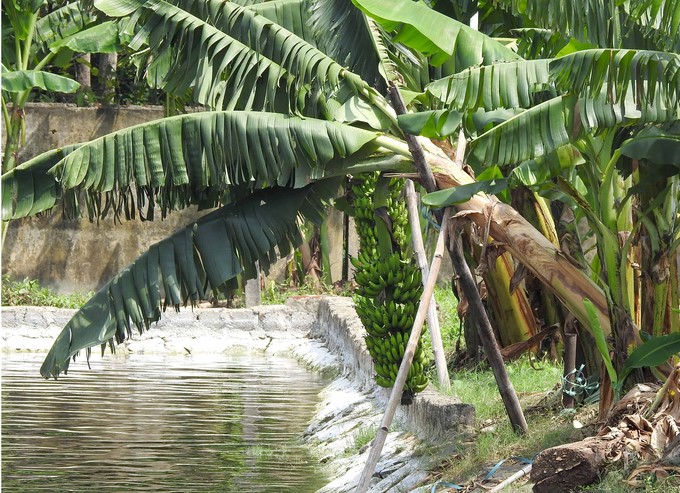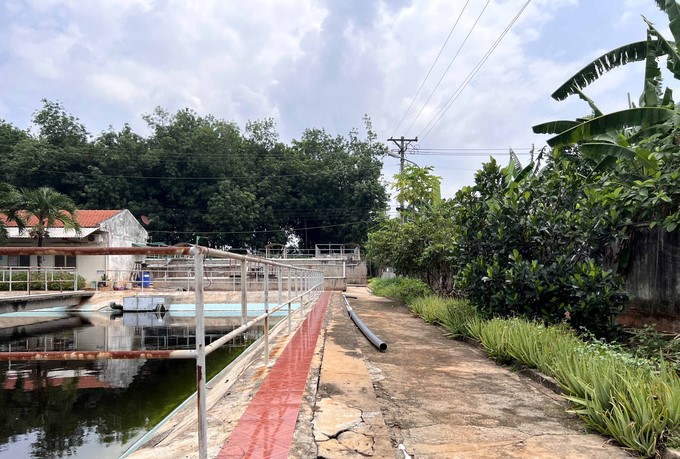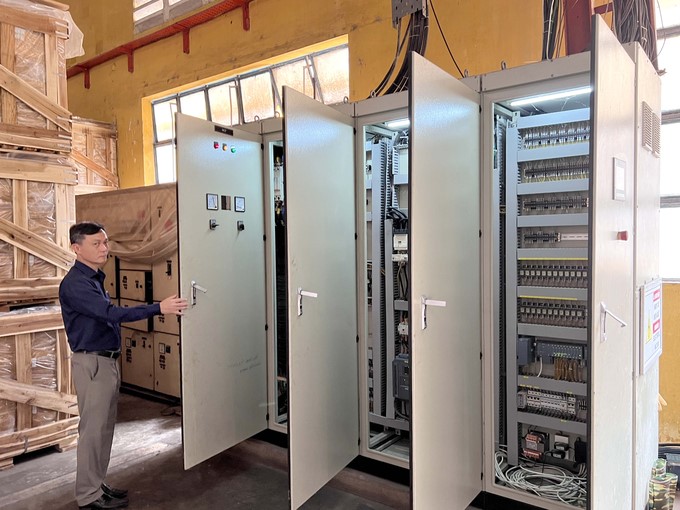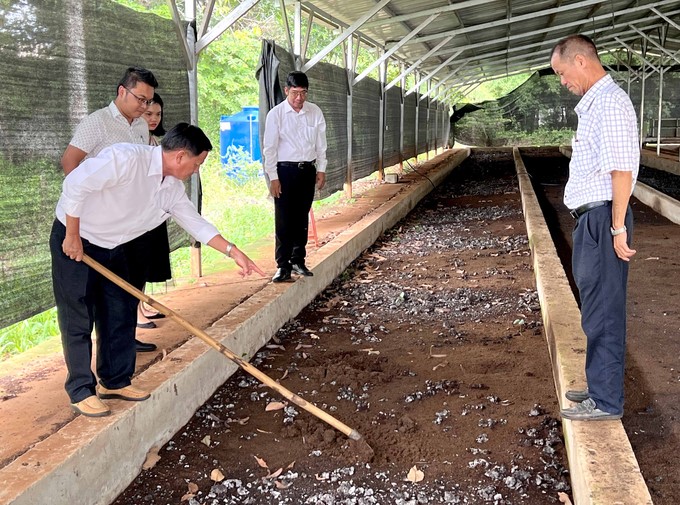May 30, 2025 | 10:06 GMT +7
May 30, 2025 | 10:06 GMT +7
Hotline: 0913.378.918
May 30, 2025 | 10:06 GMT +7
Hotline: 0913.378.918

Lush green banana trees laden with fruit in the wastewater treatment area of the Center Factory, Phu Rieng Rubber Co., Ltd. Photo: Thanh Son.
Visiting the Center Factory of Phu Rieng Rubber Co., Ltd. (Phu Rieng district, Binh Phuoc), the company's leaders did not hesitate to take us to see the wastewater treatment system of the factory.
It is a natural rubber wastewater treatment system with biological methods that do not use chemicals and reuse wastewater for production. Because it uses biological solutions without chemicals, this wastewater treatment system does not cause odor but still ensures that the wastewater always reaches column A (used for domestic water supply) according to the national technical regulation on natural rubber pre-processing wastewater.
Wastewater meets A standard, so in the last tank before discharge, factory workers take advantage of it to raise fish and grow fish normally. Around the wastewater treatment tanks, there are many kinds of fruit trees, such as bananas, guavas, etc., that are all green and lush. Those are proofs of a well-operated wastewater treatment system without environmental pollution. Because if the wastewater treatment system pollutes the environment, surely the surrounding trees cannot grow and be so green and lush.

Lush green trees in the wastewater treatment area of a factory of Binh Long Rubber Company. Photo: Thanh Son.
The wastewater treatment system at a factory of Binh Long Rubber Co., Ltd. (Binh Long town, Binh Phuoc) is a similar case, with no odor, lush green trees around the treatment area, and wastewater reaching a Column A used for domestic water supply.
Phu Rieng Rubber Company is promoting the reuse of wastewater in production, specifically for washing impure latex, a process that consumes a lot of water, thereby significantly reducing the amount of clean water used in production. Binh Long Rubber Company is also reusing wastewater after treatment (reaching approximately 100%), thereby contributing to cleaner production and production cost reduction. Two companies also actively reuse solid wastes such as crumbs of rubber latex, plastic waste, etc.
Not only is Phu Rieng Rubber Company building a waste water treatment system without using chemicals at the factory, but reducing the use of chemicals is also being applied in many production stages, from farms to factories.
The company has applied chemical-saving solutions such as: monitoring and managing the company's technical norms in production activities; reducing the amount of NH3 to preserve latex from the farm to the factory; reducing the amount of acetic acid used to freeze the cup latex, etc. The company’s reduction of the use of chemicals not only contributes to environmental protection but also helps the company save more than VND 1.15 billion in 2022.

The inverter system helps to save electricity in the Center Factory of Phu Rieng Rubber Company. Photo: Thanh Son.
Besides, in order to contribute to the reduction of greenhouse gas emissions, Phu Rieng Rubber Company always maintains and focuses on activities to save electricity, water, and gas. Specifically, the company has invested in an inverter system to save electricity in the factory, reuse wastewater in production, use a steam boiler using biomass to replace LPG in drying raw latex, and disseminate energy savings to employees. Thanks to these activities, the company will save more than VND 1.38 billion in 2022.
Also, In the past year, Phu Rieng Rubber Company spent more than VND 1.9 billion on activities such as environmental sanitation and garbage collection at main roads, where waste is generated near residential communities at the units; billboards disseminating the work of rubber forest protection (protection of plants and animals; prevention of rubber forest fires), etc.
The implementation of activities in the fields of environment and sustainable development has brought about positive effects such as raising awareness about environmental protection and natural resource protection for not only the company’s staff but also people living in the area. Creating a green-clean-beautiful landscape and working environment contributes to improving health, quality of work, and quality of life.
In many rubber latex processing factories, the circular economy is being promoted to both protect the environment and improve economic efficiency for the company. One of the most remarkable circular economy models is the use of biological sewage sludge from wastewater treatment systems to produce microbial fertilizers.
According to Mr. Nguyen Quoc Toan, Deputy Head of Industry Department, Phu Rieng Rubber Company, the sewage sludge after treatment is collected by the company and then composted into a microbiological sludge to fertilize rubber trees, with an output of about 200 tons/year.

Biological sewage sludge is used to raise compost worms at Binh Long Rubber Company. Photo: Thanh Son.
Binh Long Rubber Company has also implemented a scientific research project on the production of microbial probiotics from compost worm farming technology with a cost of over VND 2 billion and a capacity of about 700 tons/year. Accordingly, 100% of the biological sludge from the company's wastewater treatment systems is used to raise compost worms and produce biological products instead of inorganic fertilizers to fertilize rubber orchards.
Mr. Bui Van Manh, Deputy Head of the Industry Department (Binh Long Rubber Company), said that the sewage sludge from the latex processing line has been analyzed and shows no harm to the environment. Therefore, taking advantage of this sewage sludge will create a closed rubber production cycle in the direction of sustainable development. Bio-organic products contribute to reducing the use of chemical fertilizers, helping plants grow well, increasing resistance to pests and diseases, and reducing the use of pesticides, thereby protecting the environment.
This bio-organic production process can be widely applied at units throughout the rubber industry, helping to save quite a lot of costs in sewage sludge treatment and protecting the environment. At the same time, this process contributes to reducing the cost of fertilizers used in rubber orchards.
Translated by Huyen Vu Thu
/2025/05/25/4127-3-073637_820.jpg)
(VAN) Thanks to the promotion from an FAO-implemented project, vegetable production in greenhouses in Moc Chau has seen strong development, from 1.5 hectares in 2021 to nearly 50 hectares in 2024.

(VAN) FAO has recently supported USD 140,000 to implement the project 'Risk mitigation human-animal interface risks through disease control initiatives in pig farming.'

(VAN) The People's Committee of Tra Vinh province has approved an adjustment to the investment policy for the Green Hydrogen Plant project, increasing its area to approximately 52.76 hectares.
![Reducing emissions from rice fields: [2] Farmers’ commitment to the soil](https://t.ex-cdn.com/nongnghiepmoitruong.vn/608w/files/news/2025/05/05/dsc08881jpg-nongnghiep-140632.jpg)
(VAN) Clean rice cultivation model in Thuong Tan commune, Bac Tan Uyen district, is assisting local residents in achieving sustainable agriculture by substantially reducing costs, increasing productivity, and protecting the environment.

(VAN) At the conference to disseminate Resolution No. 68, AgriS introduced its digital agricultural ecosystem and reaffirmed its commitment to accompanying the Government in promoting private sector development and sustainable agriculture.

(VAN) 'Blue Ocean - Blue Foods' initiative is designed to restore marine ecosystems and establish sustainable livelihoods for local communities by cultivating a minimum of 1,000 hectares of cottonii seaweed in the first three years.
/2025/05/21/4642-3-112707_603.jpg)
(VAN) The V-SCOPE project has made direct contributions to three out of six pillars of the Comprehensive Strategic Partnership between Vietnam and Australia.